Podcast: Download (Duration: 44:46 — 41.2MB)
Get Notified Of Future Episodes Apple Podcasts | Spotify | Amazon Music | Android | Blubrry | Gaana | TuneIn | Deezer | Anghami | RSS | More
Episode highlights:
00:29 – Just what IS OwnTheRacecourse?
05:24 – You want to serve these three groups
06:18 – A chocolate wheel and an octopus
11:32 – Why make a podcast?
12:53 – The sexy part of marketing
15:41 – Two alarming mistakes to avoid
20:04 – Ideas and where to get them
22:24 – Why should someone consume your content?
22:45 – Five ways you can map it out
23:51 – THIS is the whole point of your post
25:44 – An absolutely critical element
31:47 – Creating your content
34:47 – Putting it out there
35:51 – Now what?
37:57 – For more leverage
40:04 – Finding out what worked
40:52 – Do it all over again
42:31 – Summing it all up
Let James help you take back more control of your business and your lifestyle. Click HERE
Transcription:
Hey, James Schramko here, and welcome to this very special video/podcast. This one is on the topic of OwnTheRacecourse, and in particular, what’s changed in the last five years and how it is still relevant for your business especially when it relates to how to market your business.
A quick recap
I want to start off by just a quick recap. What is OwnTheRacecourse and a little bit of history. It was five years ago that I published OwnTheRacecourse to the public. It was a course. It was very successful, and I’m really well known for OwnTheRacecourse or as many of the aficionados call it, OTR. So in the last five years, I’ve consistently been using more or less the same course strategy to maintain authority and control of my marketing and to have a position in the market that is strong and highly leveraged. And the most important thing to consider is this: it still works. It’s the main strategy that I have.
I’ve taught it to many others. It’s a chapter in my upcoming book. I’ve got case studies from significant marketers. People who you may have heard of. Kevin Rogers from CopyChief. Ezra Firestone from SmartMarketer. Ryan Levesque from the ASK method. And Greg Merrilees from Studio1Design. Jarrod Robinson, The PE Geek and now TheAppMatch.com. And the list goes on. I’ve got many, many case studies. And that’s because it works.
I’ve seen people taking the original idea and running with it and experimenting. I recently caught up with a friend of mine, Taki Moore, who you may know teaches black belt. He got the idea from me, the way that he saw me organize it, and he’s been trying to fit things. So I wanted to share the core concepts with you because I think the message is as relevant as ever. So let’s get into this.
One of the main things that caused OTR to be successful is the transfer of this idea from real business world to the online business world. You see, back when I was in the real business world, which was about 10 years ago, I was running Mercedes-Benz dealerships as the general manager. I was also getting some great information from mentors. I was reading books from people who are no longer with us, or studying courses. And of course, I had some bosses. One of my bosses used to drum home this idea of OwnTheRacecourse.
 It works like this – a lot of people are being the racehorse on someone else’s racecourse. This is like, for example, if you set up a Facebook page and this was your only marketing, you are now the racehorse in Facebook’s racecourse. Now, if Facebook want to change the rules, as the racehorse, you’ve got no say in that. Now you might win, you might lose. But when you lose, you lose everything. But if you’re the racecourse owner, then you win all the time. It doesn’t matter which racehorse is in the race. So I’m not suggesting you’re going to create a Facebook. But I am suggesting that you build on an asset that you own and control and then use everyone else’s racecourses to send people back to your place.
It works like this – a lot of people are being the racehorse on someone else’s racecourse. This is like, for example, if you set up a Facebook page and this was your only marketing, you are now the racehorse in Facebook’s racecourse. Now, if Facebook want to change the rules, as the racehorse, you’ve got no say in that. Now you might win, you might lose. But when you lose, you lose everything. But if you’re the racecourse owner, then you win all the time. It doesn’t matter which racehorse is in the race. So I’m not suggesting you’re going to create a Facebook. But I am suggesting that you build on an asset that you own and control and then use everyone else’s racecourses to send people back to your place.
So you can still utilize Facebook. You can still utilize iTunes. You can still utilize YouTube. You can still utilize Google. The thing is, you are pointing people back to your own website and building your primary goals. So let’s talk about that in more detail.
One of the things that stops people from building their own asset is it’s just too easy to put your content in someone else’s racecourse. It’s very easy to upload a Facebook video. It’s very easy to switch on Facebook live. It’s very easy to use YouTube as your entire base for the business. You have a YouTube channel or a YouTube marketer. But I saw a friend of mine recently bemoaning the demise of all of his friends whose accounts got shut down. Well, his friends were not very business savvy and they were single-source dependent.
“The whole concept of OwnTheRacecourse is reducing compromise.”
So the whole concept of OwnTheRacecourse is reducing compromise. I remember Jay Abraham teaches the Parthenon theory. When I went and saw the Parthenon in Greece recently, I almost had an emotional moment because I saw those pillars, the multiple pillars of the Parthenon. It’s just a reminder not to be single-source dependent. You want to have an income stream per pillar. You basically want to have multiple traffic streams, pillars of traffic, and that’s really what OwnTheRacecourse solves for marketers.
So if your entire business is dependent on launches or affiliate business, if your entire business is dependent on a single source of paid traffic, if your entire business is dependent on YouTube or a Facebook group, then you’re in serious trouble whether you know it or not. Now hopefully after this training, you’re going to know it and you’re going to do something about it.
3 groups to serve
So why are you going to do OwnTheRacecourse? Well simply, you’re going to have more profit for less effort. You’re going to be building an asset that works for three main groups that you want to be serving. One is the group of prospects. So people who you would like to market to, to let them know more about your business where they convert into a customer. Second group is people who are customers, like ready to buy right now and you can convert them instantly rather than having to build them up over time. And the third group, and this is the one who’s most often ignored, is your existing customers. These are people who have already done business with you, but it’s a great way to stay in touch with them and to market to them in multiple modalities.
One of the coolest things is that you don’t have to be super consistent for this to work because the system will take care of that. It’s very leveraged on your time. You don’t have to do any specific work. But I’ll detail the steps for you. There are about 10 steps that you’ll need to follow. And it really flips this whole idea or the myth of the ascension model, or the tripwire or the funnel on its head. You don’t need that. That is a total myth perpetuated by people with a dog in the fight. They might sell training on how to do tripwires. They might sell certifications. They might sell software that builds funnels. And that’s fine. And that’s one way to do it. But there are other ways to do it.
The chocolate wheel method
The way that I teach it is more of a chocolate wheel method, which is imagine your business as a wheel and you have different products or segments, and now you can have multiple front doors. Every single piece of content that you produce, whether it’s a video or an audio, can be leveraged across multiple mediums like an octopus’s tentacles spreading out, bringing people back to the head and the head is your website where you want the optin and as a secondary thing, the remarketing cookie. So that’s called the octopus method. So think about OwnTheRacecourse as being like an octopus. We’re going to use our tentacles into everyone else’s racecourse. We’re going to draw people back into our racecourse, and we’re going to have control, and we’re going to build an asset that serves those three critical groups of cohorts that are going to make your business super profitable. So let me explain more.
“Email is still important.”
So we take this concept of the octopus and we realize that now, this is a lot like longline fishing. Multiple pieces of content that are going to hook the right customer into our ecosystem. So the sort of goals that we want to have, the payoff if you like, is this – we want to get an email address. That is still very important. Email is not going anywhere in the short term. It’s still critical to get an email address. So we put an optin on our site. For every piece of content, we’re going to have an individualized piece of content. Other people call this a content upgrade. But the point is, the content upgrade is tailored for the specific piece of content. I’ll give you an example.
For this video/podcast that you are watching or listening to right now, there is a content upgrade available, which is a checklist. It is a PDF checklist of all the steps for OwnTheRacecourse. So you can go and download that. Now that is specifically relevant to this podcast episode. You’ll be able to give your email address in exchange for that PDF document. This is how you build an email list of relevant customers and prospects.
The remarketing cookie
The next thing that we want is we want to get people coming to our site so that we can tag them with a remarketing cookie. So to do that, we’re going to need to buy our own domain name. Now the reason a lot of people don’t buy their own domain name is it’s just too easy to have a Facebook page. But what about in the future when Zuckerberg or someone in his team decides they don’t like your type of business? What about when they shut it down? How is it going to be for you then? And this is a serious concern.
So I would encourage you to still get your own domain name and host it on a website. A WordPress blog is fine for this. When people visit your site, you’ve got that little remarketing cookie, which might be AdWords or Facebook or both or something else. And when they visit, you can tag them and you know which page they visited and you can even know how long they visited and you can target them later. This is vitally important. My friend Mike Rhodes calls this an invisible marketing list. So remarketing is a great way to build another type of list other than an email. But it gets better than that.
You see, when you have your own website, you’re also going to start attracting Google searches. You’ve got the benefit of SEO, Search Engine Optimized content. Now, there’s not much to SEO these days. It’s simply having really good navigation, the correct page title, a good description. Label your images properly. Have unique and valuable content. Make sure your site is easy to navigate, that it’s fast loading and you’re not doing anything tricky to try and generate spammy backlinks. That’s it. You’re going to rank well.
If you want proof of that, go and search for terms like “ikigai”. You’ll see that SuperFastBusiness ranks really well for that. I also rank well for my name and the business name. And this is important. Because if I meet someone at an event or they hear me on a podcast, do you know what they’re going to do? Even if they’ve seen me on Facebook, they’re still going to Google me. And Google is going to present sites. I want to be in control of those search results, and I can be more in control of those search results if I have my own website and I control the content on that. That’s what OTR is all about – control. No compromise.
I get to say what’s on my site. Nobody else does. And Google is going to be my partner, and they’re going to help me with that. But if I lose Google, all is not lost because without SEO, there are still other things. But I just encourage you, while SEO is not the sexy topic of the month, it still brings an enormous amount of traffic to my website and it’s so easy to do when you see how we do the OTR process. So I’ll continue.
Why make a podcast?
The next thing we want is we want to strip out the audio and make a podcast from this. And why do we want to do that? Because we want to tap into iTunes. Apple has created this amazing platform where it’s so easy for you to leverage your ideas. You can talk once, record it and have it listened to thousands and thousands of time for years down the track. When I survey all of my customers, the number one traffic source and conversion source, and that’s important, is iTunes podcasts. And that’s because people listen to me. They get valuable insights. They can get a result for free. They can demonstrate what I’m all about before they buy anything. They can listen to me when they’re walking the dog, going to the gym, driving the car, where you can’t watch a video. And it’s now being integrated with car dashboards. The iPhone and iPads have been so prolific. And Android devices, of course, you can make your feed work on Android, that it is putting you in reach of a customer.
But importantly, this is another way to build your database. You now have a push notification list. When people subscribe to your podcast or show, they are going to automatically be notified when you have new content. Maybe that’s how you found out about this episode. And this is very important because it’s another way to reach people and they’ve subscribed for it, so it’s relevant.
The social media platform
Now the next place that we’re going to be, and this is where everyone seems to have gravitated to, and it is sexy, is the Instagram, Facebook, the social media stuff. Now if you’re in a market like mine dealing with business owners, then Facebook is definitely where it’s at. But I’m sure that a lot of businesses should be on Facebook. Instagram is really getting traction, especially with stories. I’ve started putting more work into my Instagram. I’ve got to say, it’s good to hang back and wait. If your whole business was Periscope dependent, then it’s fallen off a cliff. This is the danger of being too quick to rush in.
And I also have strong feelings that SnapChat’s been too much of a fad. I can’t connect with it being useful for my business. And I think Instagram is going to win that battle. So it’d be really interesting to play out. But don’t be too fast to jump on the fad. I don’t think Facebook’s going anywhere. And I don’t think Instagram’s going anywhere real soon.
There’s some leverage in Twitter. It certainly works for Donald Trump. If you’re in an enterprise market or you sell to businesses or employees, so if you’re selling to big companies, then of course LinkedIn is going to be something to pay attention to. If you like writing, then you’re going to have a look at things like Medium. And if you’re in a highly visual market or an ecommerce market or product market then things like Pinterest might be useful to you as well. So pick the social flavor that works for you.
Obviously, it’s not going to be Google Plus and it’s not going to be MySpace. So pick the ones that are just right for you. This is where you’re also going to get subscribers. So for example in the SuperFastBusiness page, there’s over 10,000 people who like that page. So whenever we upload new content or upload a video or share content that goes back to our website, people are going to see that and then of course it provides huge opportunities for us to make special segments, to create look-alike audiences and to advertise to these people and to get an extra boost. We’ll cover that in the next few steps.
Of course, it’s really important if you have video content or if you have audio content and you can combine images to consider YouTube because it is one of the top search engines in the world. We certainly will load up our videos to three places. So back in the old days, five years ago, this is one of the changes. We would only put it on our website and then we would share the link on Facebook. We might make a teaser on YouTube going back to the site. But now, we will upload the entire video on our website, and on YouTube and on Facebook and we’ll get that native captive audience. But we’ll still link to the content upgrade in the notes that accompany that post as the call to action and we’re dragging people back to our site hoping for an email address and getting that remarketing cookie.
So let’s talk about the two mistakes that I see people making when it comes to OTR. Aside from the obvious one, which is not building any asset at all and putting their entire business on someone else’s platform, but I’ve covered that; so hopefully, that’s not even going to be listed as a mistake. The first message that comes out that I think is not quite accurate is to be everywhere all the time, omnipresent if you like. I think this is unrealistic because of a few reasons. One is it takes an enormous amount of resource. You can’t direct all of your resource in getting everyone’s attention all the time without it suffering somewhere else. So it means you’re going to be a workaholic.
You might start resorting to automation and these spammy tools that become very impersonal and robotic. And you can see this like on Twitter. They’re just like regurgitating, regurgitating, regurgitating stuff. You can tell when someone doesn’t actually do their own Facebook stuff because it’s not quite personal. So if you can bring a personal element or human element to it then that’s good. And don’t worry so much about frequency, like having to be there all the time. If you’re actually away for a while, people will think, ‘Oh, I wonder what happened to him.’ And then you come back they’re like, ‘Oh, I remember that.’ And I found this out by accident actually by having some podcast hosts that are kind of hard to get a hold of.
One of them we’ve stopped the show, FreedomOcean.com. The other one, we only did a few episodes this year, which is ThinkActGet.com. And the other one, we’re yet to do one this year, and that’s SalesMarketingProfit.com. So what I found is people crave the show. It’s like when you have to wait ages and ages for a new episode of Game of Thrones and then you can binge on them all at once. That’s actually OK. So I believe when people say, “You’ve got to be everywhere, you’ve got to be across all the mediums, you’ve got to be consistent,” it’s baloney. It’s just not true.
The other thing is, you start not being relevant because the more places you’re trying to put that content, the more one-size-fits-all it becomes. It’s not tailored for the platform, and I would argue that your content for your blog can be different content than what’s relevant for Facebook live. I’ll cover the difference about that shortly. The other thing is that Twitter is very different to Instagram. So you can’t just spray your content across all the platforms all the time. You’re just going to create noise and no signal. I’m all about having a strong signal.
The second big mistake is oversharing. This is between having a life and then thinking that everything has to be shoved onto a live camera. This is a compromise. And OwnTheRacecourse is about no compromise. So when you have to go to a resort and your primary MO is to pull out the camera and walk down the beach and start bragging, you’ve crossed the line. You stopped living. I think success is going to a resort or a beach and not doing a Facebook live. It’s not even taking your laptop.
I did a whole post on this – The Travel Test, which is can you travel without your laptop? Do you actually have a business? And are you able to spend a day or two away from Facebook without it causing all sorts of withdrawal symptoms? Because I think it’s sad actually and people are stuck in this vortex of workaholism and prolific Facebook content creation and ad hoc uhm ahh, unprepared live videos, like, ‘Uhm, ahh, yeah, oh there’s Fred.’ The romper room effect, I call that. It’s fake.
I think live is really good for news and it was probably invented to share amazing stuff like fireworks on New Year’s Eve, sure. You spot a whale out the front, put it on Facebook. That’s the sort of thing it was invented for. It wasn’t invented for marketers to be spraying us 24/7. And when I do want to create content, I’ll produce it and I’ll put the time and effort into it. I’ll give my audience the courtesy of preparation and research. I’ll check my notes. I’ll organize it and I want it to be easier to consume. So I’m going to give you that checklist right now.
“Create more signal and less noise. “
11 steps for OwnTheRacecourse
So the fix of course is to create more signal and less noise. I’m going to share with you the 11 steps for OwnTheRacecourse.
1 – Collect ideas
The first step is to collect ideas. There’s 11 or 12 places you can get ideas. It’s having random thoughts in your dreams right through to the notes that you’ve collected in your notebook, or your online journal, or your Excel spreadsheet, or your Evernote. You can check your helpdesk and see what sort of questions you’re getting asked all the time. You can talk to your community, or your forum, or your members either face to face, at a meetup or in the community. You can attend live events or workshops. You can meet people and discuss with them what’s topical. You can research your market. You can look at tools like Buzzsumo and see who’s popular with certain topics and go and have a look at their content and research it.
You can check reviews. Go into Amazon and other sites and read reviews and see what problems people are having, what people think is fantastic. You can conduct your own survey like Ryan teaches in ASK method, a deep dive survey. You will have years’ worth of content ideas just from one deep dive survey. You can go and have a look at AnswerThePublic. It tells you pretty much every question on any topic, AnswerThePublic.com. You can have a look at your Analytics and you can see what content you’ve created in the past. Your old blog content, your old podcast; which ones got the most downloads, which ones would people stay on the page the longest, which ones got the most optins. This is the sort of topic to mine out.
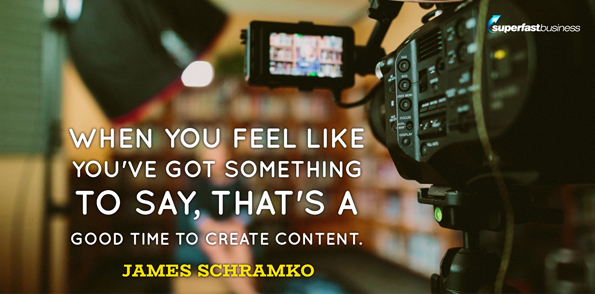 You can also ask your team because if you’ve got a team and they’ve been around you for a while, they’re probably brilliant and they will have great suggestions if you can open them up. You can also search Google. It’s this great tool for finding out stuff and it’ll give you some ideas. And finally, when you feel like you’ve got something to say, that’s a good time to create content. Sometimes, I don’t feel like I’ve got much to say. I actually had a year or two off making daily videos because I felt like I’d said most of the things I’d wanted to say. But now, I’ve been building up steam. I feel like I’ve definitely got some things to say.
You can also ask your team because if you’ve got a team and they’ve been around you for a while, they’re probably brilliant and they will have great suggestions if you can open them up. You can also search Google. It’s this great tool for finding out stuff and it’ll give you some ideas. And finally, when you feel like you’ve got something to say, that’s a good time to create content. Sometimes, I don’t feel like I’ve got much to say. I actually had a year or two off making daily videos because I felt like I’d said most of the things I’d wanted to say. But now, I’ve been building up steam. I feel like I’ve definitely got some things to say.
And I know this training might be semi-controversial but that’s OK. I’m known for being a contrarian. But I also have one of the most relaxed lifestyles with the most profit of anyone that I know, and it’s because of OTR and I really feel compelled to share that. And of course, I’m going to invite you to get extra training with me inside SuperFastBusiness membership, which is one of the key points and we’re going to get to that.
So step one, collect your ideas from everywhere to come up with the information you need for step two.
2 – Come up with the subject line
And step two is to come up with the subject line for the topic, which essentially is the big promise or the hook, whatever you want to call it. This is the reason why someone will be compelled to consume your content, which leads to step three, which is to outline your episode.
3 – Outline your episode
So there are several steps that you can do in this phase. Here are five things you might be able to consider using as your bullet points when you’re mapping out the content for the episode.
You could create a story. Stories are very compelling. You can do news. You can update people about what’s different, what’s changed. You can do a user case study. Talk about someone where they were at, what their situation was, what the challenges were with that, what problems that caused, what you prescribed as a solution, what they did about it, what results they got. You could do FAQs. You’ve seen a lot of ask me anything, AMAs, ask such and such. So you can prompt people to send in questions or you can use the research methods that we talked about before.
And the other thing, if you’re just compelled to have a rant, then point out to people what you know that nobody else knows. That’s the ultimate Peter Thiel style question. This will get controversy. It’ll get traction. And it’ll probably get shared. But just be warned, you’re not going to have everyone love that content.
4 – Think about your call to action
And now we’re up to step four, which is the call to action. And this is the most important thing, this is the whole point of the post. Because the call to action is effectively making your post a sales page. So here are four things that I suggest you have for consideration for your call to action.
One, they buy something. Please buy something. “Click here” is a good one. If you would like to join SuperFastBusiness membership, click here.
Two, maybe you’d like people to share your post, because sharing, it gets it in front of other people who are just like your prospect and this means there’s a good chance someone else will see it and you’re going wider with your marketing.
Three is leave a review or a comment. This is getting some organic comments to your site. But these days, it’s not as big as it was five years ago. Now people are far more likely to comment on the YouTube video or in the iTunes store or on the Facebook post, wherever you embed the video on the Facebook page. So you might ask people to make a comment.
And the fourth thing that you might consider is perhaps they could download the resource guide or the content upgrade. We don’t call it a content upgrade for our customer, but I’m going to share with you next the ideal content upgrades to offer to increase and maximize the chance of someone giving you an optin.
By the way, if you’re really liking this post, then I suggest you download the checklist that comes with this post. I’ve put together a comprehensive checklist of all the things you need to do to go step-by-step through OTR. Download the PDF checklist, go through it, and watch your marketing improve.
5- Content Upgrade
Alright, so we’re coming up to step five, which is the content upgrade and this is absolutely critical. I’m going to share with you six types of content upgrade that will help you collect emails from your blog posts, from your content that will help drive your email list, it’ll grow bigger and bigger, and over time give you more opportunities to make offers and get customers. So here we go.
Number one is, of course, a transcription. Even though we post the word-for-word transcription, it’s amazing to me that still a lot of people will download the PDF version of the transcription. I imagine they like to store it. It’s definitely a neater, tidier version. If we have a video, it has screenshots where there’s graphs or important things. So it is still a more valuable piece of content than just a blog post because a lot of people like to actually save the content. And then there’s even another set of people who like to print it out and actually my demographic where I have quite a lot of more mature audience, they still print things out, which is crazy, but true.
Now remember with content upgrades, the main rule of thumb is you just have to help people be better off. It’s more valuable than just the blog post. So it’s something very enticing and it’s really helpful. In my case, I’m doing all of this for free. So I’m just extending this huge amount of free content so that over time, my buyers can identify with me and say, “Yes, I want to come to the next level of whatever you’ve got because I love the free stuff.” This is a form of demonstration. This is giving people useful reasons to still remain on your email list because we are not the obnoxious, five-times-a-day email marketer. When we send out emails, they’re valuable. People look forward to them and the information is going to help them be better off.
So let’s talk about the second type – the checklist. The checklist is simply a step-by-step, tick-a-box checklist. It’s some form of a worksheet if you like that will help somebody go from the start to the end and have achieved something. So it’s a tool. It’s a useful device and these are very popular at SuperFastBusiness.com.
And mindmap can instantly convey a whole bunch of information in just a visual representation. It’s easy for people to follow along the different nodes. A tip here is if you give people the first layer of a mindmap but you’re selling the second layer, i.e. where you expand into more of the nodes and go deeper, that is a great first step towards a sale.
The fourth type is a cheatsheet. A cheatsheet can be a summary or quickstart method of getting an instant or fast result. So I used to publish a cheatsheet for people who are learning how to build websites, and the cheatsheet was really useful. It just gave you in a few sentences or paragraphs by topic, the shortcut. It’s the 80/20 if you like. It’s like the study guides you might have had if you ever went to school or university. It’s a small document that gives a big powerful result. It’s also kind of a catchy, sexy title.
The next thing is some kind of a bonus audio or video. So a rich media. You could have an excerpt or a behind the scenes or an expanded module that people can go and download. So they’ve listened to a podcast or watched a video or read a blog post but they want to get something more, a deeper, richer thing. This is like when we used to have DVDs and there was like a director’s cut at the end or there were interviews with the actors and those sort of things, extra features. These days, you’ll see people in their books. They’ll call people to a website to get extra features. It is a really great way to get the most hyper-interested customers; the ones who are more passionate are going to download this extra bonus, rich-media content.
And finally, if you have the ability to, or you’re in a market where it makes sense, consider some kind of software or spreadsheet where people can put in numbers and calculate results. So you might be able to make a spreadsheet, say if you’re a copywriter; or a software tool where people can put in some components and end up with the perfect elevator pitch. Or maybe you’re in an accounting or financial type market where people can put in dollars and percentages and end up with a calculation that’s really useful for them that shows them how the future might look and of course, you might be a part of that solution, whatever you’re selling would bridge them to that solution.
So there you go. They’re my top content upgrade resource tips. I suggest you consider that this is like longline fishing. You will over time have more and more content on your site that will cause people to opt in. Of course you should segment them when they opt in. Segment relating to whatever they opted in for so that you can be relevant with them in your marketing. You’ve given them fantastic value. You’re building your share value in the marketplace as an author or an expert or the one I hate, thought leader; but you’re actually helping people, and that’s the important thing.
If people want to go to the next level of help, they’re more than likely going to buy. Remember to put a call to action in every content upgrade. At the end of it or through it, you can have links to your site. You’ve earned that. And of course, treat the emails with absolute respect. Remember what they opted in for. If you’re going to continue to send news updates, make sure you delineate that or market out very clearly on the thank you page.
When people opt in, give them exactly what they opted in for. In some cases where we have a worksheet, we will give the worksheet and the transcription as an extra bonus, which we don’t even necessarily mention. So they’re going to get supreme value. This is a great way to get to know people, and these things can be shareable too. You can encourage people, ‘Hey, if you really liked this, then let someone else know about it,’ and link back to the original blog post.
6 – Produce
The sixth step is to produce. This is where you record the information. I like to do this the raw version. I’ll do an interview on Skype or I will make a video like I’m doing now with my iPhone and the Lav mic, a couple of lights set up, very low tech. That’s it. iPhone, Lav mic, two lights, a whiteboard with some ideas written on it, and a tripod, a Manfrotto tripod and a little grip like this. That’s it. That is the entire tech that I’m using to make this. You don’t need a lot of tech. So don’t worry about what camera to use and all of that. Whatever is in your pocket is fine.
“Don’t worry about what camera to use.”
So now I put that into a Dropbox or a Drive folder and I say to the team in Slack, “Here’s a needs editing.” I’d name it the way that I want the show to be called and then they edit. So if you want to know more about team, I’ve got this fantastic training called The Four Mistakes that Business Owners Make When It Comes to Hiring and Training a Team and How to Fix It. It’s inside SuperFastBusiness membership. I’ve presented this seven or eight times now. It’s been wildly popular. I suggest you check it out. It’s going to help you hire, train, manage and lead.
But anyway, the team will take over that content and they’ll produce the whole thing. Edit it, uhms ahs, intros, sliders, logos, whatever’s needed, insert images, and they’ll make it beautiful. They’ll polish it up. I’m giving them the coal and they’re making the diamond. So anytime you listen to a podcast or see a video that I’ve made, the team have intervened and fixed me up. They’ll adjust the lighting and everything. You should’ve seen me before in the raw version. Wow, it was terrible.
So the team is fantastic. They just kick in. This is the leveraged part because while they’re doing that, [whispers] I’m surfing. And sleeping. And watching Netflix. So you just have to do the work. Everything I’ve done up til now is the big work. Now it’s time to kick back and let the system take care of it. When they think they’ve got it nailed, they put it into a Slack channel called “for approval.” I just scan it. If I like it, I do nothing. I say, “OK. That’s great.” I issue praise. If I want to change it, I’ll make suggestions and they’ll change it. If I don’t get to it for a few days, they’re just going to publish it anyway. And if I still make changes, they’re going to go back and change it because here’s something very important, and Jeff Bezos talks about this, about one-way and two-way doors. On the internet, you can publish a video or an audio or text and it can be easily changed tomorrow.
Now, I’m not talking about you crazy young people on Facebook who are uploading pictures of you vomiting at a rock concert or whatever. That stuff is probably going to be on the internet forever. But it’s easy to change out a video for another video, or switch out an audio for another audio, or change a few words of text for a call to action. That’s the easy stuff. It’s not a big price to pay if you get that a little bit out of whack. So give your team some confidence and let them try this.
7 – Publish
Step seven is to publish. So when our stuff is ready, if it’s approved, it’s just automatically going to be published. It’ll definitely be put on our WordPress blog at SuperFastBusiness.com. We will put the video there in a private player so that we have control of that, that I own that content. It’s not going to be banned or blacklisted. We will transcribe it, put bullets, put tweetables, and that’s publishing to our site. We’ll also, if it’s a video, we will publish to YouTube and we’ll put a description and a link to the content upgrade. We’ll also publish to our Facebook page, which later, in the next step, I’m going to syndicate to my personal page. But we’ll publish on the Facebook page. That gives us opportunities now to capture people right there where they are.
“Every piece of content can be a sales page.”
But we’re still going to link in the notes to where the content upgrade is because that is the call to action. And remember, like the tentacles of the octopus, we want to lead people back to the head. Every piece of content is a sales page. That’s what’s amazing about OwnTheRacecourse. We’re bringing them back and owning that customer.
8 – Syndicate
Now, we’re in step eight, which is to syndicate. So we now share this. It’s been produced. It’s been published. We’re going to send out an email to our customer list saying there’s new content. This is one of the powerful aspects of OwnTheRacecourse. We’re sending out an email to our audience every week, at least once, sometimes two or three times, and here’s the correlation – more emails, more offers, more sales, more profit. You want to make more profit? Then send out more emails with offers. Every piece of content has a call to action, which asks people to do something that helps me and helps them, primarily to buy SuperFastBusiness membership, or to come to the Maldives mastermind, or to attend my live event. These things will help the customer and they’ll also help me.
So if I create more content, I make more sales. I’ve tested this. I’m absolutely adamant. If I do one podcast a week, my multimillion-dollar business sustains at a very steady level. If I do three podcasts a week, it actually climbs up. So that’s what I thought is very interesting. More content. So you’ll see more content from me because I’ve tested this and I feel like I’ve got something to say.
Now the team are also going to share some of this on Instagram and Twitter, those other social places that I mentioned before. Instagram’s a good place to put some teasers. You can put a link in your bio to your blog or the most recent post in Instagram. One post a day is acceptable for Instagram. If you want to do stories in between, personalize it, then that’s great. I think that’s where it’s overtaking SnapChat for my usage. Twitter is good to just be popping up stuff linking back to old posts as well. You can load up a tool like MeetEdgar or something similar, CoSchedule that will send people to your content for a long time. Your team can pre-load that. Now the team can run most of these social sites, but I think having some human element is good. Don’t just let the robots take over because people will be able to tell.
9 – Promote
Step nine here, it’s time to promote. So we have already produced, published and syndicated. But we’re going to promote this. So we could run some paid ads. If we’ve put our video on YouTube, we could run YouTube ads. If we’ve put our video on Facebook, we can run Facebook ads. We could also run AdWords if we’re in that kind of business. Or even LinkedIn if you’re in that platform. Instagram, Twitter, so forth. So there’s opportunities here.
We could also go out with joint venture partner. Maybe we have an affiliate and we want to share with them some of the profit. So you might decide that if they can drive traffic to your post that you’d like to reward them. You might give them their own piece of content or their own version of the video they can put in their own ecosystem and promote that with their specific trackable URL, which is a fancy way of saying website address.
Programs like ThriveCart, which is what I use, make it very easy for you to have an affiliate link that tracks them and allows you to give them the commission that they want. If you’ve had a guest on the show then it would be appropriate to email them or tweet them and let them know that your content is now live and maybe, if you’re lucky, don’t expect it because it doesn’t always happen, they might promote it to their audience as well. That’s what I would call a vanity boost. So people will promote their own stuff. I know when people mention me, I’m more likely to share it because if it’s good or I’ve been on their show, I don’t mind sharing it because it also gets me on other shows and my name gets out there.
You also might now be finding that it’s good to leverage guest shows. You could let people know that you’re available for interview or podcast. You’ll then start to get invitations and you can start being part of other people’s ecosystem. Now yes, you’re a racehorse in someone else’s racecourse then, but it’s still a tentacle and it leads back to your racecourse, back to the head of the octopus. It’s another tentacle you should deploy. You might even do a press release if you’ve got some significant news. If you’ve just acquired a company, sold a company, released a new product line or got some kind of innovation, there is actually a space for newsworthy press.
10 – Review
Step 10 is review. This is where you look at your Analytics. You track the behavior on your site. You look at the downloads. You check SEO rankings. You see which posts on Facebook got the most reach, which ads converted and what the cost is. You learn what you can from this and you put this back into the machine. Some of the things that I found is with videos, shorter videos can actually get far more views. With podcasts, 25 minutes seems a really good length for my audience. I have done podcasts over an hour and I’ve done some about three or four minutes. But 25 to 35, 40 minutes seem to be a sweet spot. Also if you do series, if you’ve got enough content to do multiple series, then do multiple episodes and you can actually stretch it out over three, or four, or five parts and you’ll get more listens.
11 – Repeat
Step 11 is repeat. You’ve done something that works well – repeat. I’ve been doing this OTR stuff now for many, many years. Six, seven, eight years maybe. I continue to do it. I’ve inspired a generation of marketers to create content. I was doing daily videos way back. Maybe 2009 I think I started this, eight years ago. Now I was inspired by seeing Gary V at an event. So I got my inspiration from what he was doing with WineLibraryTV. So I didn’t invent this idea. But the main spin that I put on this, and it’s a valid one, is this big business idea that you can still create an asset that you own and have some control over and still take advantage of all these fancy, prolific social media sites.
So please, don’t just build on one site. Don’t be a YouTube video marketer in exclusivity. Lead people back to your site. Get an optin if you can and you’ll have a stronger business for it. Because as Facebook keep messing around with groups and advertising and swattling feeds, you’re going to see more and more people complain. Every single time, someone bleats like a sheep. “Oh, Facebook screwed me” or “YouTube screwed me.” You know what people say? OTR. OwnTheRacecourse. It’s a choice. You can do it. It works. And I encourage you to get going with this if you’re not already doing it. And if you are, maybe some of the ideas that I presented in this particular episode will help you refine what you’re doing.
In summary
So it’s time for a summary. With OwnTheRacecourse, every piece of content you do is researched, it’s relevant, and it is a sales page because it has a call to action that leads someone to a place where they can be better off and you can be better off. It guarantees your existence because you’re getting a list subscription not just from email, not just from a website remarketing, not just from iTunes, not just Google rankings, not just Facebook feed, but all of those combined and they’re working as a concert to give you a strong presence in the places that matter, but it’s super leveraged because you’ve got a system driving it.
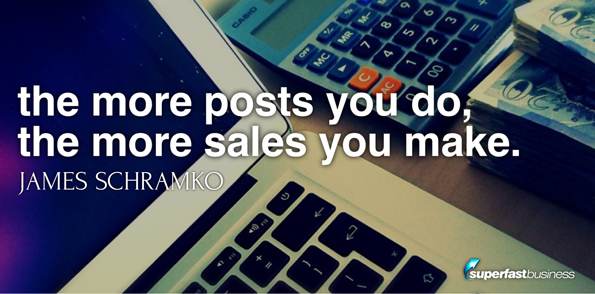 Remember, the more posts you do, the more sales you make. Posts equal profit when you use OTR. OTR caters for prospects, buyers and previous buyers. All three groups with one marketing activity. And this is why I don’t need to do launches. I don’t need affiliates. I don’t run a lot of paid traffic. I’m not single-source dependent. This is a sustainable business model. It’s easy and it’s leveraged.
Remember, the more posts you do, the more sales you make. Posts equal profit when you use OTR. OTR caters for prospects, buyers and previous buyers. All three groups with one marketing activity. And this is why I don’t need to do launches. I don’t need affiliates. I don’t run a lot of paid traffic. I’m not single-source dependent. This is a sustainable business model. It’s easy and it’s leveraged.
Remember you can get a resource, which has the checklist for everything I’ve talked about in this episode. I’m James Schramko. Hope you’ve enjoyed this. Of course if you think this is valuable, please share it. If you really think it’s great and you’re listening to it on iTunes, or you’re watching it on YouTube, or even seeing it on a Facebook feed, then go below wherever you see this and leave a review. That would be fantastic and I’d really appreciate that. And of course, I’m waiting to coach you personally and privately inside SuperFastBusiness.com membership. You can check out the details at the SuperFastBusiness home page, just click on the boxes and you’ll find the right path for you. I hope you have a fantastic rest of the day.
Join the OTR tribe inside JamesSchramko membership. Click HERE
Get details of the new OTR book
Want more episodes? Subscribe to us on iTunes
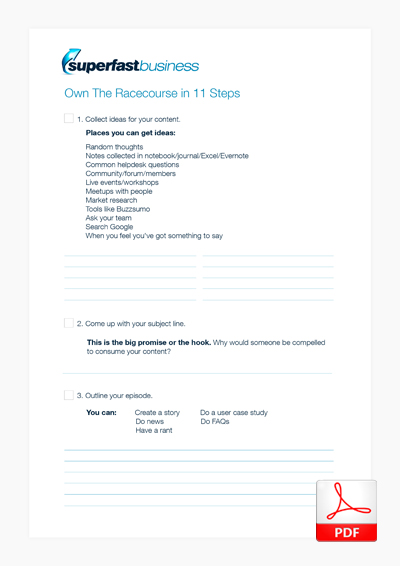
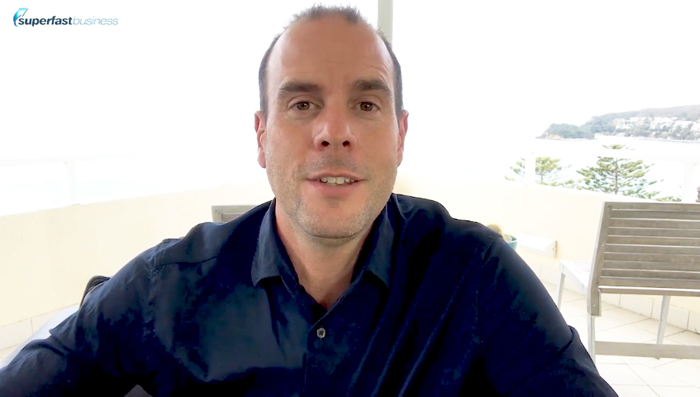


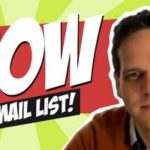







Thanks for the session today James, really enjoyed it and reinforced what I know I need to do. Cheers
Thanks for the session today James, really enjoyed it and reinforced what I know I need to do. Cheers
Perfect! I wanted to go deeper on the topic inside SuperFastBusiness Membership and the Webinar training is now posted inside for members. Glad you could make it Garrick.
Thank you for the new OTR training… after a long walkabout I’m returning to business. This is just the guide I need.
Absolutely awesome. When my business is ready to go I shall come knocking on your door !
This is the third time I’ve listened to this training in various ways. So solid and helpful. I’ll be back for another listen in another 6 months! Thanks James
Hi James,
Wow that is an awesome post. Love visualizing the pillars.
I like the part about do you really have a business if you can’t be on the beach without your laptop or phone.
Much love and prosperity!
-Tommy Lentsch
IMDb Page
Very helpful, thanks for this. I’m curious: how do you host your videos
natively? Usually, for WP, this is not recommended because of bandwidth,
so I’ve always embedded from YouTube. But, like you say, this is me
being a horse. Is Vimeo a better idea?
Hi Marianne, I use and LOVE Wistia. Vimeo is another one you might use. Youtube is ok as well for getting you more views just watch the leakage back to YT though… and always keep a backup of your video on your own computer or DRIVE or dropbox just in case.